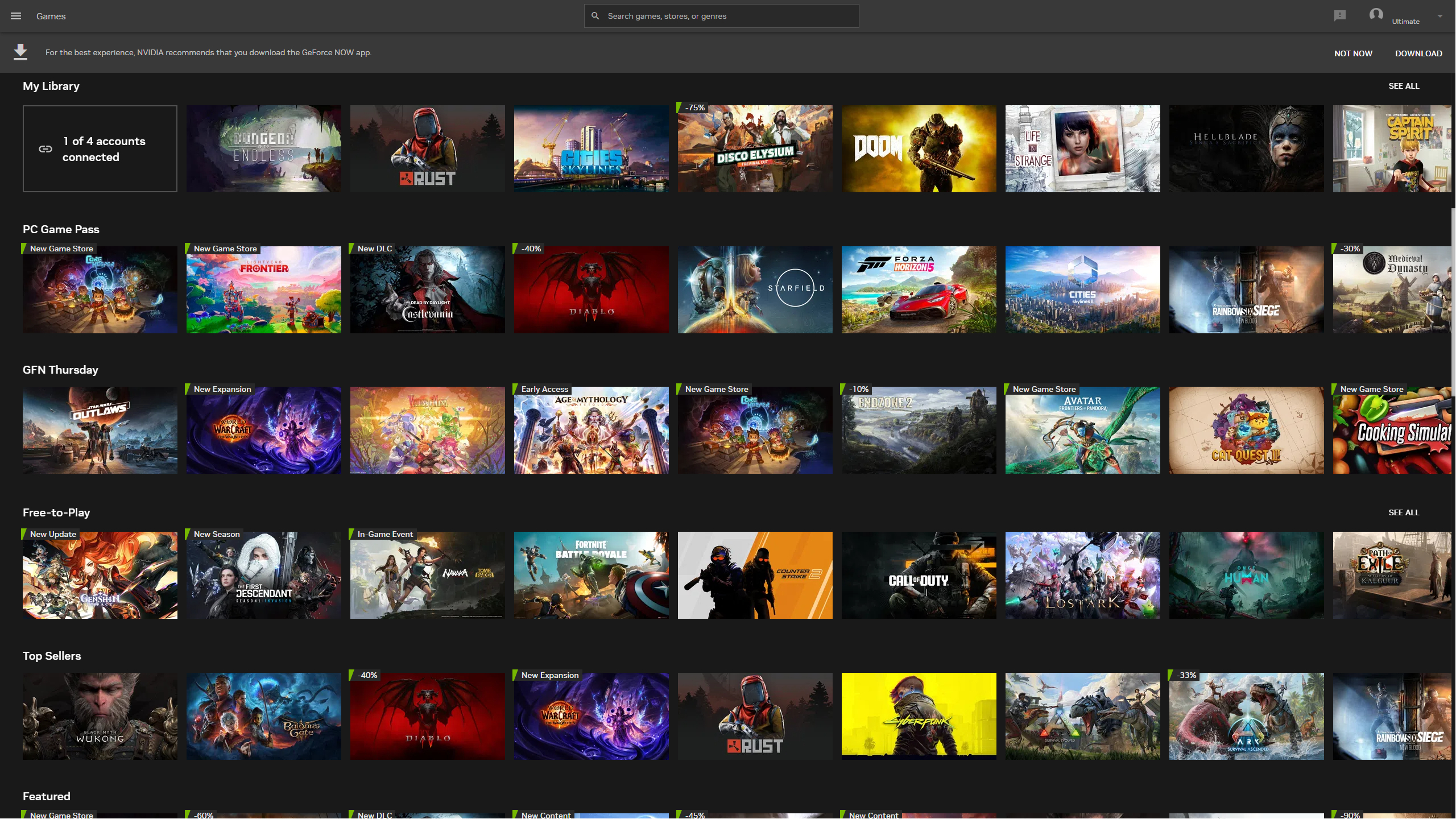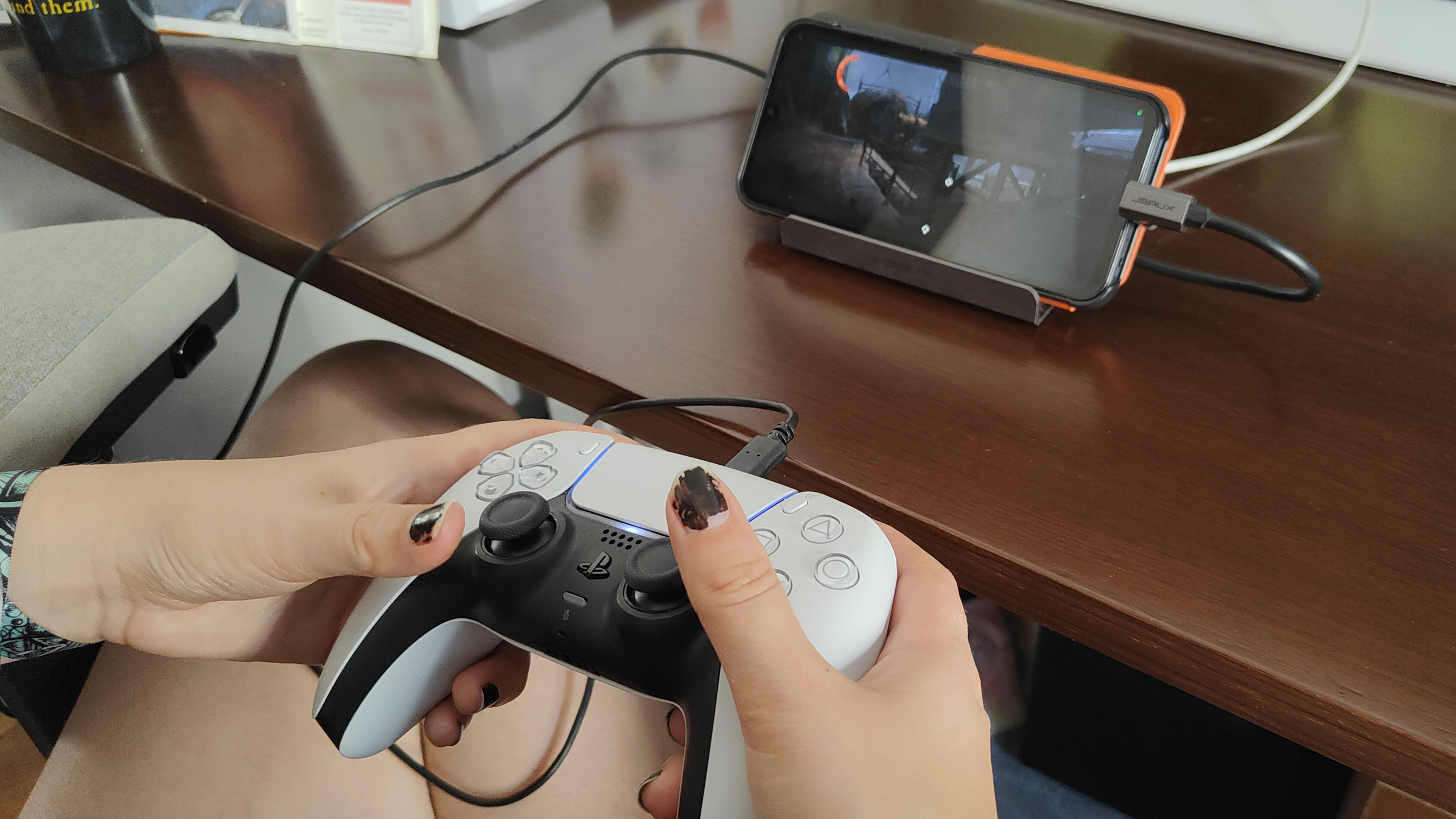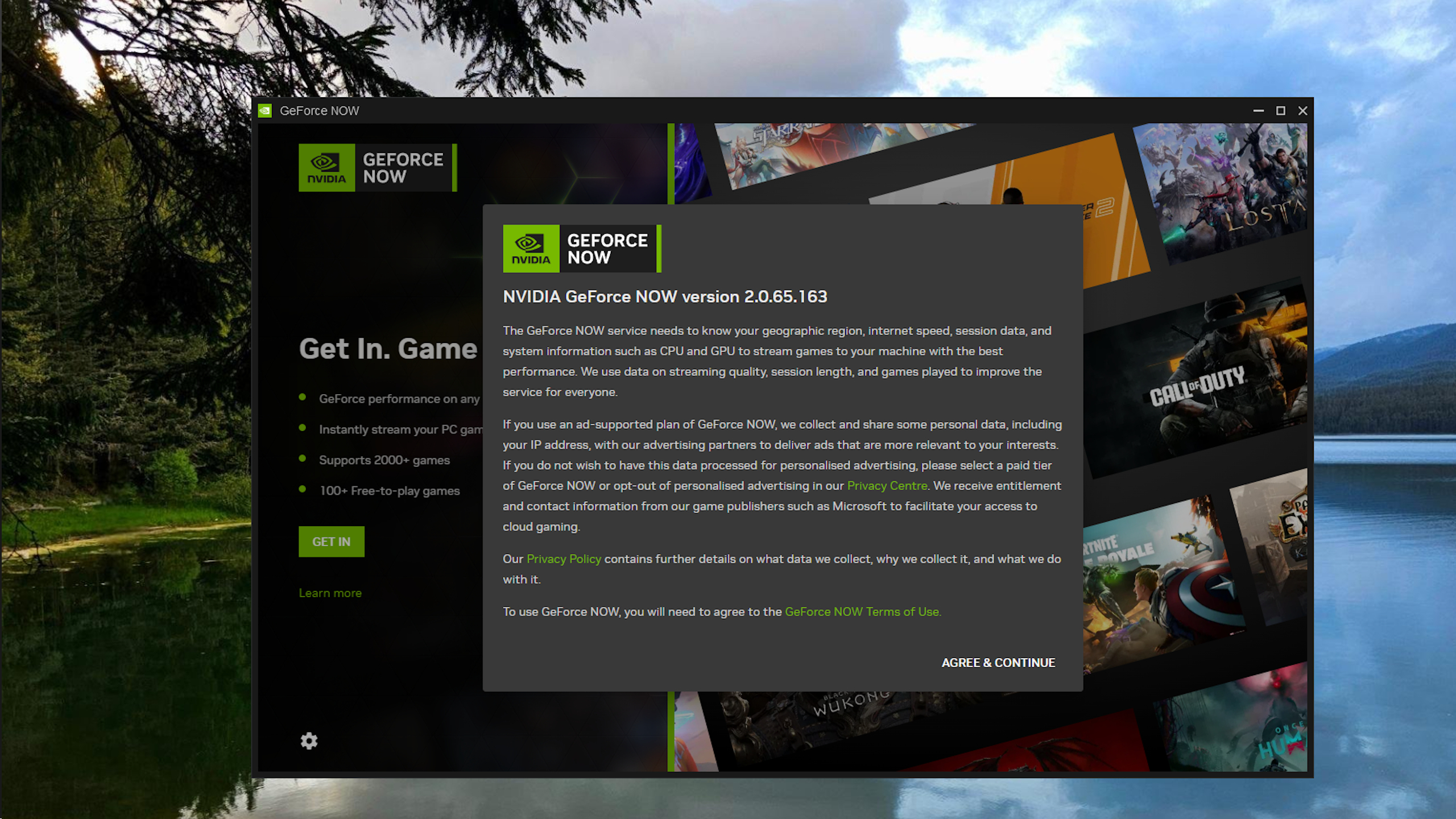Nvidia GeForce Now: Two-minute review
GeForce Now (GFN) is a monster cloud game streaming service. With three distinct payment tiers – each providing access to gaming rigs of differing power levels and over 1,800 top games to play through them – it’s one of the most comprehensive cloud gaming services around. It’s not without its downfalls, and it may be better suited to a specific kind of gamer, but there’s a lot to like about GeForce Now. Not least the ability to play games in all their Ray Traced glory on an RTX 4080 equivalent rig, from wherever you have good internet access.
One big draw for GFN users is the option of a free tier, and even a reasonably priced day pass should the mood strike you on your day off. In fact, there’s a great deal of choice for GFN users depending on what you’re willing to spend. Spend nothing and there’s going to be a couple of big caveats. For one thing, Nvidia reserves the right to sell free tier users’ data (including your IP address) to its partners. Aside from that little nugget, GeForce Now’s free tier offers only one-hour-long sessions with ads between them, which means depending on the game you’re playing and the server popularity, you could be waiting in a queue for a while each time you’re booted to the lobby.
Still, as long as you can find a machine that meets the low-as-anything system requirements (and you can see the text) you’re good to go either in a browser or with the GeForce Now app. I’ve been playing Doom: Eternal and Dishonored 2 on my Samsung Galaxy A15 from home, which while a little awkward with the small UI, is super convenient. The bottom line here is, yeah, GFN is portable as heck.
Of course, your experience on any tier is going to depend on how stable your internet connection is. And while most normal coffee shops might pose an issue, you’ll be hard-pressed to find an internet cafe today that doesn’t provide the minimum 25Mbps needed for 1080p gaming at 60fps. Gaming on IOS or Android is even easier provided you play games with a resizable UI, since dropping to 720p requires just 15Mbps internet speeds. That said, I would recommend using an Ethernet cable whatever device you’re using, especially if you’re going to attempt any kind of competitive gaming, because you just don’t know when the Wi-Fi will drop out.
Working with 70Mbps for most of my time playing over Wi-Fi, I did see a bit of a packet loss spike when my partner started downloading movies. Otherwise, I had no major issues playing in 4K at 120fps without an Ethernet cable.
That was with the Ultimate Tier, which gives exclusive access to Nvidia’s RTX 4080 servers. And while the top tier of GeForce now is a little more expensive than its main contender Amazon Luna, Nvidia has done the honorable thing in keeping the Ultimate tier down at the same price as it would have been to play with an RTX 3080. And as far as hardware goes, Amazon can’t contend with GeForce Now. Its Tesla T4 GPU servers sit closer to the RTX 2080 Super in terms of real-world performance, which means missing out on a whole two generations of gaming advancement.
GeForce now remains one of the most convenient, reliable, and straightforward game streaming services considering the reasonable system and internet speed requirements, and simple, fairly priced payment tiers. 4K streaming at 120fps is the cherry on the cake.

Nvidia GeForce Now: Price and availability
- Free Tier isn’t actually that bad
- $9.99 / £9.99 per month for Priority, or Ultimate tier for $19.99 / £19.99
- Day passes are a little expensive
GeForce Now is the same price across the board for US and UK users and is available in loads of other countries across the globe with differing tier options. For the UK and US, you can choose from Free, Priority, and Ultimate tiers which are limited to one-, 6-, or 8-hour sessions, respectively, with increasing server priority and hardware specs at the higher end.
Nvidia’s choice to opt for a straight-up three-tier subscription means there’s no confusion over what you’re paying for. You can’t add extra bundled channels for Ubisoft, Retro, or Family games like Amazon Luna allows, but it’s simple and easy to understand. The ability to purchase each game individually on your platform of choice through GFN means you won’t lose access to your games, too.
As long as you already have bursting Epic, Xbox, Ubisoft, and Steam libraries, and no high-powered gaming rig to play them, GeForce Now Ultimate is well worth the fee. That’s especially true considering it’s the same price as the RTX 3080 tier was previously. If you already have a middling gaming rig and don’t go out much, it’s probably not worth the price of a subscription just to add a few fps and some RTX capabilities to your games.
The fact you can jump in and try out GeForce Now for free is a great option, though, if you’ve already spent your cash on a new game.
There’s also the option of both Priority and Ultimate day passes – 24 hours of gaming for £3.99/£3.99 or £7.99/$7.99. Compared to the monthly price, these are a little pricey for just 24 hours of game time.
Nvidia GeForce Now: Specs
| Row 0 – Cell 0 | Free | Priority | Ultimate |
| Price | £0 / $0 | £9.99 / $9.99 | £19.99 / $19.99 |
| Specs | Basic rig | Premium rig | RTX 4080 rig |
| Panel support | 1080p | 1080p | 4K, Ultrawide, HDR |
| Session Length | 1 | 6 | 8 |

Nvidia GeForce Now: Features and interface
- Clunky UI with a controller
- Easy to drop in and out of games that would eat up storage
- Server timeout means queuing & reloading mods
No matter your platform, the Amazon Luna interface is simple and easy to navigate. It shares a lot in common with video streaming services, as each game is presented through a panel where you can then view a trailer or further details. When you’ve found a game that you want to try, you simply hit the prominent “Play now” button and wait a few moments for it to begin. Some titles take a little longer than others to start, but I found that I could get into most games in under twenty seconds which is an impressive result.
When you’re in-game, you can hit a shortcut to open a basic overlay that displays the option to quit or begin live streaming via Twitch. In addition to capturing your gameplay, the Twitch streaming option supports external microphones and webcams giving you everything that you need to capture your reactions. Multiplayer games also allow you to start a Luna Couch session. This gives you a short code that you can share with your friends, allowing them to quickly jump into your game without the need for their own subscription. It’s a fantastic feature and one that I found worked surprisingly well, even while playing with friends with less reliable internet connections.
Games can be played using touch-screen controls, a compatible controller such as an Xbox Wireless Controller, or a keyboard and mouse if you’re on PC. You also have the option to use your phone as a wireless controller via the Luna Controller app in a pinch, though the lack of physical inputs and cumbersome layout make this a little more trouble than it’s worth.
If you’re struggling to find games to play, the Luna home screen lets you sort games by a variety of criteria, including different genres and age ratings. You can save your favorites to the ‘Playlist’ tab, making for a simple way to keep track of any longer games that you might want to dip in and out of.

Nvidia GeForce Now: Game library
- Heaps of online multiplayer games
- Not so many retro games
- Mod lovers beware the free tier
For GeForce Now players, there are more than 1,800 games to choose from at the time of writing. Sure, there are going to be a few games in your library that aren’t supported, but your average gamer will find most of their favorites up there. In particular, there are a lot of competitive online games compared to other streaming services.
Against Xbox Game Pass, the number of games available is tenfold for GFN players, and while GeForce Now doesn’t give access to as many retro games or versatile bundle options as something like Amazon Luna, it lets you make the most of the hardware it offers through a vast and relevant library.
There are even a good deal of strategy games for those who, like me, aren’t big into role-playing games (RPGs) and online battle royale games, though you’ll likely want to avoid getting the free tier if you rely on lots of mods. You’ll need to redownload your mod library every session, so the fact-free tier is limited to an hour could see you downloading your game’s entire mod library once per hour. It makes the free tier far less appealing for us sandboxers.
Should I use GeForce Now?
Use it if…
Don’t use it if…
Also consider…
Still not sure that you’re desperate for 4K gaming at 120fps? Here’s how GeForce Now compares to two other cloud game streaming services.
| Row 0 – Cell 0 | Nvidia GeForce Now | Amazon Luna | Xbox Cloud Gaming |
| Price | Free £0/$0; Priority £9.99/$9.99; Ultimate £19.99/$19.99 | Free with Prime; Luna+ £8.99/$9.99; Ubisoft+ £14.99/$17.99; Jackbox £3.99/$4.99 | Console £6.99/$9.99; PC £9.99/$11.99; Ultimate (PC and Console) £14.99/$19.99; 14 days intro £1/$1 |
| Maximum output | 4K @ 120fps | 1080p @ 60fps | 1080p @ 60fps |
| Minimum system requirements | Windows 7 (64 bit), Dual-core xX86-64 CPU, 4GB RAM, Graphics that support DX11 | Chromium web browsers, Windows 10, MacOS 10.13, Android 9, iOS 15, Linux, Ubuntu | Varies by game, performance scales with higher-end systems |
How I tested GeForce Now
- Played a few hours a day of Baldur’s Gate 3, Hellblade, and Ark Survival: Evolved over 186 Mbps Ethernet on a low-spec laptop
- Went wireless with the Nvidia Shield and laptop to check the stability over 70Mb/s 5GHz Wi-Fi
- Tested packet loss while downloading movies
Taking GeForce Now out and about to places with different internet speeds was important to get a sense of its portability and reliability when lots of strangers were also there flicking through TikTok. I also tested it around the house on a few different devices, from the Nvidia Shield to a low-spec laptop with no dedicated graphics card, and even my Samsung Galaxy A15.
I made sure to check how downloading large files over the same Wi-Fi router would affect it, and whether it was stable when moving around the house, checking my internet speeds in each room over 5GHz Wi-Fi. I also tested over Ethernet connection on both my crap work laptop and my own RTX 3060 PC to see if it was worth adding the Ultimate tier to improve visuals.
First reviewed August 2024





